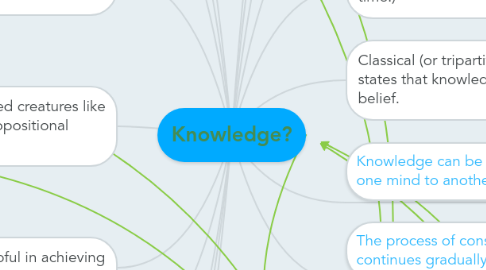Knowledge?
by Caitlin Langford

1. Knowledge is gained through experiences
2. Knowledge is gained throughout our lives
3. There are two types of knowledge propositional and ability.
3.1. knowledge is a combination of the practice re-creation of skills or information
3.2. Knowledge is a skill set, other times it is an experience from an event or something someone has seen.
4. Knowledge can be on many different topics ( geographical, mathematical, ethical...)
5. Only sophisticated creatures like humans have propositional knowledge.
5.1. Knowledge is related to the concept of being
5.2. The connections that we as humans make in our brain.
5.3. Knowledge is about making sense of the world around us and ourselves.
5.4. Knowledge is culture.
6. Knowledge is helpful in achieving our life goals.
7. Knowledge is stable (at least more stable then mere true belief.)
8. Knowledge can be shared and challenged by others.
9. Knowledge is actively created.
10. Knowledge has an adaptive function.
10.1. Knowledge is not a reflection of reality.
11. Knowledge must be true.
11.1. Knowledge does not necessarily need to be correct
12. You must believe in your knowledge.
12.1. Knowledge can be an awareness or thoughtfulness towards something or someone, knowing what they like. It can be as simple as an observation or as deep as a belief.
12.2. Knowledge is linked to our beliefs.
13. Knowledge must be justifiable (gaining a true belief by accident is not knowledge.)
13.1. accumulated through experience that was both acquired by failure and success. I have found both of these outcomes in the pursuit of knowledge valuable.
14. It is difficult to define knowledge. There are two ways to do this...
14.1. Particularism
14.2. Methodism
15. Knowledge has value (most of the time.)
15.1. Knowledge is valuable in all of its forms.
16. Classical (or tripartite) account of knowledge states that knowledge is a justifiable true belief.
16.1. Gettier shows that this is too simple and luck could still play a role.
17. Knowledge can be passed from one mind to another.
18. The process of constructing knowledge continues gradually as people are ready.
19. Constructivism
19.1. Learners actively create their own knowledge.
19.2. Generate knowledge from interactions between their experiences and their ideas.
19.3. It builds upon the student's previous knowledge.
19.4. It provides feedback when students apply their knowledge, and allows students to reflect on the learning.
19.5. The construction of knowledge is centered on the learner.
19.6. Creates an environment where each student may be successful regardless of their academic ability.
19.7. A theory about Knowledge and learning.
19.8. Teacher provided learning opportunities.


